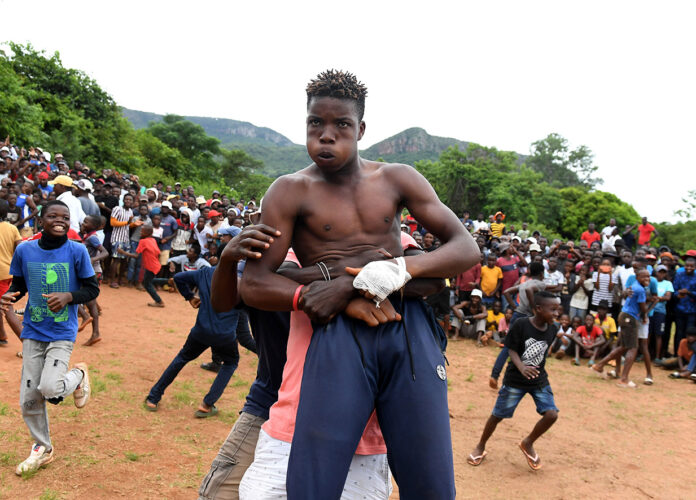Over the festive season, macho men came in large numbers to the banks of the Tshinane River on the fringes of Tshifudi village in Limpopo to prove their masculinity in the ferocious musangwe fisticuffs.
Ahead of this week’s edition, Thuso “Ngwazi” Munyai was the reigning champion after knocking out several opponents during last year’s event.
Among the prominent fighters were men who go by nicknames such as Cena, Noko, Chenge, Timer and No Risk.
Munyai said musangwe is an old tradition in this neck of the woods where young men exchange blows on an arid field as part of their transition to manhood.
“Musangwe is a tough sport and those who participate in it develop a hard heart. This teaches young men to endure pain and to stand up to any challenge,” he said.
Since its inception in 1829, musangwe has always been a brutal, bare-knuckle fight among young men who would gather to brawl for entertainment and superiority.
Musangwe is not for the faint-hearted – people have almost lost their lives in their quest to prove their maleness.
It is a no-holds-barred affair where there are no rules, no gloves, no headgear and no time limit. Even if you are knocked down, you can get up and continue to fight. Only when a fighter submits by raising his hands can the fight end.
In these rolling hills of the far north, musangwe remains the same where men turn out to partake in these short bursts of violent beatings that test their opponents’ toughness and prove their own. Aside from an injury or two, fighters walk away with little more than respect and bragging rights.
Safety concerns are largely ignored and some fighters have left the battlefield with battered and bruised faces.
Legend has it that one man died fighting in musangwe in the early 1900s. He is honoured in an unmarked memorial near the site of the fights.
It is reported that the longest fight lasted for five days in 1998 as the two arch-rivals kept fighting two-hour rounds each day. Neither fighter wanted to give in until spectators called the village elders and convinced them to call it a stalemate.
One of the village elders, Mulalo Nephawe said musangwe has not been only for power among men but once women know that someone has emerged triumphant at the fight, they will throw themselves at him.
“Women were initially not allowed to watch musangwe fights. They were only given the results and the winner would be received well among them. The winner will also be given the freedom of the village until the next fight. Musangwe has always been an ample demonstration of power and respect.” Nephawe said.
And over the festive season, while the event is underway, elders emphasised that musa-ngwe is one method of educating young men about honour and appropriate conduct.
According to musangwe chairman, Azwipheleli Ramanada, the annual event usually attracts crowds of more than 4 000 spectators from far-flung areas to witness men battling it out.
“People from as far as Kwa-Zulu-Natal, Free State, Mpumalanga and Gauteng attend the musangwe events. There is plenty of action there. Over the years, musangwe has been growing and people are showing greater interest.”
With no paramedics on site, Ramanada said should a fighter collapse, someone would just squeeze his testicles, and he would spring back into action.
Musangwe was fashioned by legends like Tshilidzi “Poison” Ndevana, a fierce pugilist of the game who would enter into battle with a swagger, intimidating broad shoulders and clenched fists. When still alive, he was crowned champion for many consecutive years.
When Ndevana succumbed to Covid-19 complications in May 2020, the legion of musangwe devotees mourned the death of the legend who was a former teacher.



